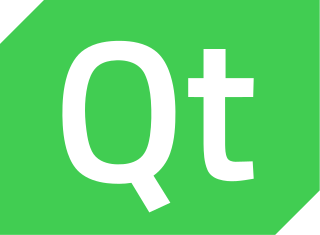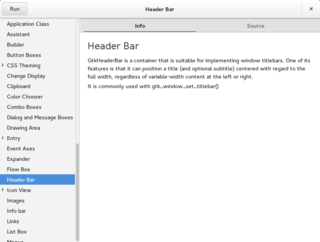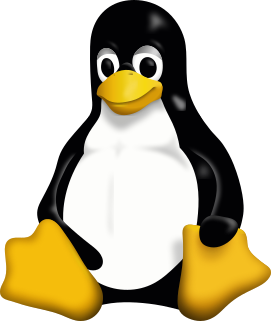
Qt is a free and open-source widget toolkit for creating graphical user interfaces as well as cross-platform applications that run on various software and hardware platforms such as Linux, Windows, macOS, Android or embedded systems with little or no change in the underlying codebase while still being a native application with native capabilities and speed. Qt is currently being developed by The Qt Company, a publicly listed company, and the Qt Project under open-source governance, involving individual developers and organizations working to advance Qt. Qt is available under both commercial licenses and open source GPL 2.0, GPL 3.0, and LGPL 3.0 licenses.
Yahoo Widgets was a free application platform for Mac OS X and Microsoft Windows, specifically Windows XP, Vista and Win 7. The software was previously called Konfabulator, but after being acquired by computer services company Yahoo on July 25, 2005 it was rebranded. The name Konfabulator was subsequently reinstated as the name of the underlying rendering engine. The engine uses a JavaScript runtime environment combined with an XML interpreter to run small applications referred to as widgets, and hence is part of a class of software applications called widget engines. On February 27, 2012 Yahoo updated the License agreement stating that as of April 3, 2012 Yahoo! Widgets will continue to be available for download but support & Development would stop.

A control element in a graphical user interface is an element of interaction, such as a button or a scroll bar. Controls are software components that a computer user interacts with through direct manipulation to read or edit information about an application. User interface libraries such as Windows Presentation Foundation, GTK+, and Cocoa, contain a collection of controls and the logic to render these.

Dashboard is an application for Apple Inc.'s macOS operating systems, used as a secondary desktop for hosting mini-applications known as widgets. These are intended to be simple applications that do not take time to launch. Dashboard applications supplied with macOS include a stock ticker, weather report, calculator and notepad; users can create or download their own.

KDE Software Compilation 4 was the only series of the so-called KDE Software Compilation, first released in January 2008 and the last release being 4.14.3 released in November 2014. It was the follow-up to K Desktop Environment 3. Following KDE SC 4, the compilation was broken up into basic framework libraries, desktop environment and applications, which are termed KDE Frameworks 5, KDE Plasma 5 and KDE Applications, respectively.
Microsoft Gadgets are lightweight single-purpose applications, or software widgets, that can sit on a Microsoft Windows user's computer desktop, or are hosted on a web page. According to Microsoft, it will be possible for the different types of gadgets to run on different environments without modification, but this is currently not the case.
A Galago, also known as a bushbaby, is a small nocturnal primate.

KDE Plasma 4 is the fourth-generation of the KDE workspace environments. It consists of three workspaces, each targeting a certain platform: Plasma Desktop for traditional desktop PCs and notebooks, Plasma Netbook for netbooks, and Plasma Active for tablet PCs and similar devices.
A JavaScript library is a library of pre-written JavaScript which allows for easier development of JavaScript-based applications, especially for AJAX and other web-centric technologies.

Empathy is an instant messaging (IM) and voice over IP (VoIP) client which supports text, voice, video, file transfers, and inter-application communication over various IM protocols.

Hildon is an application framework originally developed for mobile devices running the Linux operating system as well as the Symbian operating system. The Symbian variant of Hildon was discontinued with the cancellation of Series 90. It was developed by Nokia for the Maemo operating system and is now a part of GNOME. It focuses on providing a finger-friendly interface. It is primarily a set of GTK+ extensions that provide mobile-device–oriented functionality, but also provides a desktop environment that includes a task navigator for opening and switching between programs, a control panel for user settings, and status bar, task bar and home applets. It is standard on the Maemo platform used by the Nokia Internet Tablets and the Nokia N900 smartphone.
A software widget is a relatively simple and easy-to-use software application or component made for one or more different software platforms.

Pyjs, is a rich Internet application framework for developing client-side web and desktop applications in Python. The resulting applications can be run in a web browser or as standalone desktop applications.
ZK is an open-source Ajax Web application framework, written in Java, that enables creation of graphical user interfaces for Web applications with little required programming knowledge.
Wt is an open-source widget-centric web framework for the C++ programming language. It has an API resembling that of Qt framework, also using a widget-tree and an event-driven signal/slot system.
SIP is an open source software tool used to connect computer programs or libraries written in C or C++ with the scripting language Python. It is an alternative to SWIG.
wxPHP stands for "wxWidgets for PHP" and is a PHP extension that wraps the wxWidgets library, which allows writing multi-platform desktop applications that make use of the native graphical components available to the different platforms. It supports the three major operating systems: Windows, Linux and Mac OS X by using the PHP language. Applications are written in PHP language, and since it is an interpreted language, it does not require an intermediate compilation step in order to run the application, provided the PHP interpreter has the extension available.
JWt is an open-source widget-centric web application framework for the Java programming language developed by Emweb. It has an API that uses established GUI application development patterns. The programming model is component-based and event-driven, similar to Swing.









